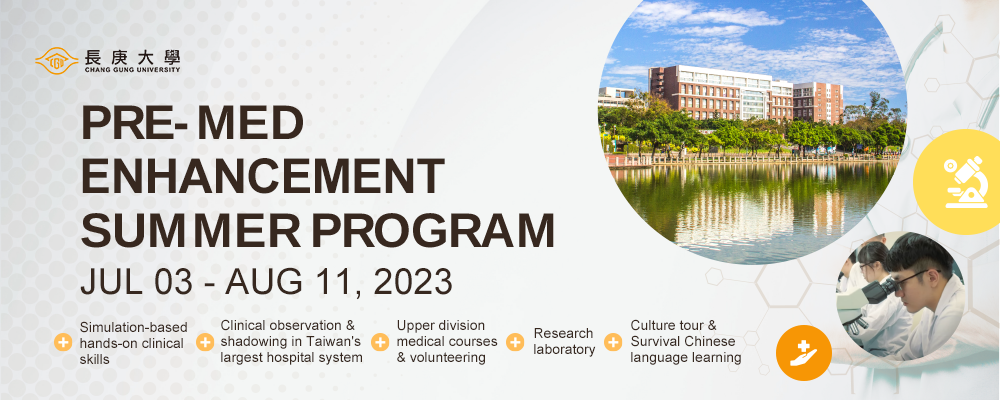2023 Pre-med Enhancement Summer Program

Course period
July 3 – Aug 11, 2023 (6 weeks)
Contents
General design:
General or advanced lectures in biochemistry and molecular biology, microbiology, immunology, physiology, and pharmacology will be provided in the program. Special lectures in human anatomy and Chinese medicine will also be included in the program. Lectures will be scheduled throughout the entire program. The lectures will be given generally three days a week. Program participants will have 3-6 hours of lectures per day depending on the needs of the lecture content.
Course description:
-
Biochemistry and molecular biology (12 hours)This course offers a comprehensive introduction to all molecules of life. The structure, replication and recombination of chromosome, RNA transcription, protein translation, and regulation of gene expression will be discussed.
-
Microbiology (10 hours)This course provides a fundamental introduction to the major areas of bacteriology, virology and parasitology. The basic structure, physiology, genetic regulation, and pathogenic mechanisms of bacteria and viruses will be discussed. A general introduction of parasitic infections, including roundworms, flukes, tapeworms and protozoan, is included.
-
Immunology (12 hours)The lectures will offer the basics of the components and mechanisms of the human immune system. The interplay between the immune system and foreign pathogens and the regulation of the immune responses are included. Finally, immune dysfunctions, hyper-activities, and the clinical applications of the immune reactions will be discussed.
-
Physiology (10 hours)The purpose of this course is to present the basic principles and facts of human physiology in a format which is suitable for premed students. The contents of the course are to explain, integrate, and synthesize information and mechanisms rather than a simple description of the body functions. Students will be guided to obtain knowledge of integrated body functions and the underlying mechanisms. Lectures will be developed from the molecule, cell, tissue, organ, and body as a whole.
-
Pharmacology (12 hours)This course integrates the relationship among chemistry, anatomy, biochemistry, molecular biology, physiology, and pathology. An overall view of the discovery, mechanisms of drug action, and the clinical development of drugs will be discussed. The content of the course will provide a foundation for clinical practice and research.
-
Human anatomy special lecture (3 hours)This course includes 1-hour lecture and 2-hour laboratory approach. The major objective of the lecture is to introduce the 206 maned bones of the human skeleton. In the laboratory, students will learn how to organize the axial (skull, vertebral column, and thoracic cage) and appendicular (pectoral girdle. upper limb, pelvic girdle, lower limb) skeletons practicably.
-
Chinese medicine special lecture (10 hours)Experiencing the beauty of Traditional Chinese medicine (TCM): connecting modern to ancient medicine. This course includes four categories of TCM knowledge: Chinese internal medicine and herb (3 hours), acupuncture (3 hours), manual therapy (2 hours), pulse/tongue diagnosis (2 hours). The objective of these courses is to acknowledge the insight of TCM and the integration TCM and western medicine, and the possible management based on TCM theory, including herbal medicine, acupuncture, and manual therapies.
The medical college of Chang Gung University has diversified research laboratories. The research areas include biochemistry, cell biology, microbiology, immunology, pharmacology, and physiology. Applicants can join one of the research laboratories for a short period of time. We will match the interest of the applicants with an available laboratory before the starting date of the program.
Laboratory list:
Center for Clinical Skills & Simulation has become an integral part of the curricular requirements in undergraduate education in Chang Gung University and postgraduate training in Chang Gung Memorial Hospital. The center provides adequate equipment and space which can be integrated with students’ medical knowledge, providing learning opportunities with reflection. The center aims to effectively improve students’ basic clinical skills and strengthen their clinical reasoning and collaborative competence of the multiple disciplinary healthcare team by simulation-based educational activities.
Course contents:
-
The role of the center for clinical skills & simulation in medical education (3 hours)
- Introduction of the center for clinical skills & simulation
- Introduction of Simulation-based medical education
- Introduction of Objective Skills Clinical Examination (OSCE)
-
Innovative teaching and learning of anatomy (3 hours)
- Introduction of Virtual Reality
- Introduction of Virtual Dissection Table
-
Ultrasound (3 hours)
- Point of care Ultrasound
- Hand-on practice
-
Clinical skills practice (3 hours)
- Simple Suture
- Casting
- Delivery
-
High-fidelity Simulation & Clinical Reasoning (3 hours)
- Introduction of clinical reasoning
- Simulator for the training of clinical reasoning
The clinical shadowing in Chang Gung Memorial Hospital includes different clinical settings in the internal medicine, surgery, intensive care medicine. An unique clinical VR/3D printed object demonstration to aid in clinical learning and therapy will also be included in this program.
-
Internal medicine
-
Nephrology
- Kidney ultrasound and kidney biopsy
- Hemodialysis and peritoneal dialysis
- Toxicology and electrolyte imbalance
-
Cardiovascular medicine
- Electrocardiogram reading
- Cardiac ultrasound
- Percutaneous coronary intervention
-
Pulmonary medicine
- Chest image education
- Bronchoscopy practice
- Respiratory therapy
-
-
Surgery
- Cardiac and thoracic surgery
- Plastic and reconstruction surgery
- Emergency and trauma medicine
- ACLS training
-
Intensive care medicine
- Respiratory failure and mechanical ventilation
- Heart failure and ECMO
- AKI and CRRT
- Liver failure and liver dialysis
- Organ crosstalk in critical ills
- Organ transplantation
- Hemodynamic evaluation and management
- Nutrition support
- Infection control and antibiotics treatment
Contact person
Academic Contact:
- Dr. Yang Huang-Yu, Director
E: hyyang01@gmail.com - Dr. Yi-Ywan Chen, Co-Director
E: mchen@mail.cgu.edu.tw - Dr. Chia-Lin Wu, Co-Director
E: clwu@mail.cgu.edu.tw
Administration / Logistics:
Linda Chang
Executive Director (External Affairs)
Office of International Affairs,
Chang Gung University
E: oia-summer@gap.cgu.edu.tw





